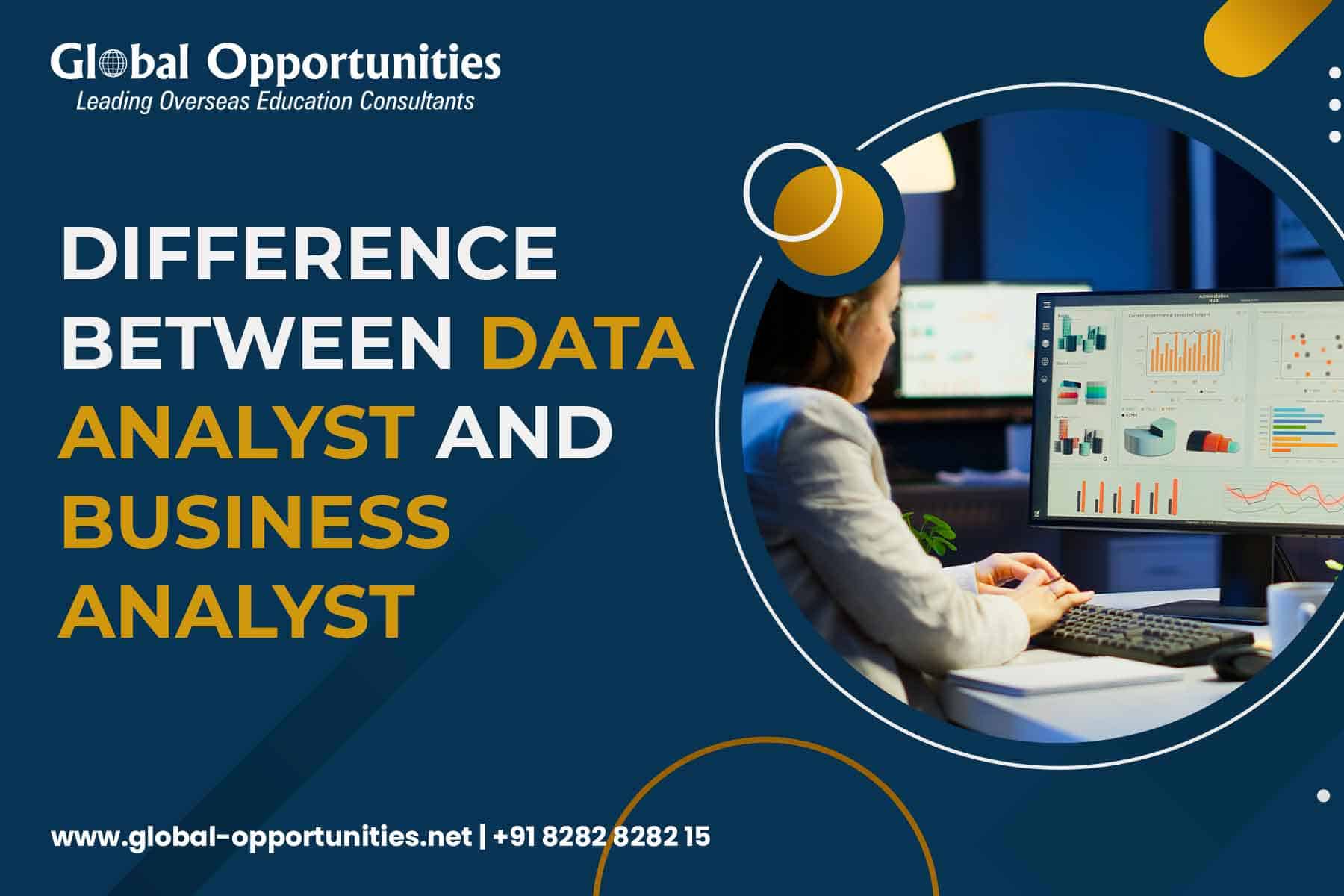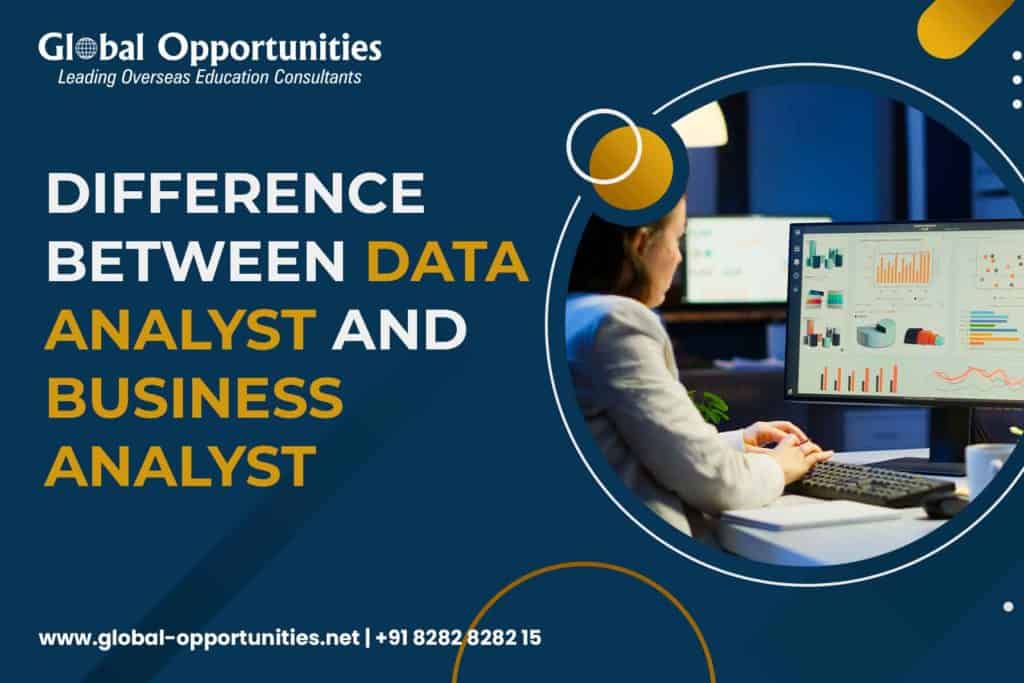Difference between Data Analyst and Business Analyst

 Let’s learn about the various difference between Data Analyst and Business Analyst. The data analytics & business analysts both help in data driven decision making in the organization. Talking about the data analysts they work more closely with the data itself while on the other hand the business analysts are involved more in addressing the needs and recommending the solutions.
Let’s learn about the various difference between Data Analyst and Business Analyst. The data analytics & business analysts both help in data driven decision making in the organization. Talking about the data analysts they work more closely with the data itself while on the other hand the business analysts are involved more in addressing the needs and recommending the solutions.
Data Analysts
The data analysts are professionals who are primarily focused on collecting, processing and analyzing data for making data driven results. One of the main aspects of data analysts is that they help to gather data from various sources, such as databases, spreadsheets and API, etc., through cleaning and filtering the data they help to remove inconsistencies, missing values and errors.
Exploratory Data Analysis
The exploratory data analysis which is a part of data analysts deals with identifying the general patterns of the data, the trends and outliers within the data. The data analysts also create data visualizations and reports to communicate findings effectively.
Predictive Modeling
The predictive modeling is a very important aspect of data analysts which deals with building predictive models using statistical and machine learning techniques. In addition to this these models can also be used in forecasting, classification, and anomaly detection.
Business Analyst
Business Analysts assess how organizations are performing and help them to improve their processes and systems. In addition to this, business analysts also help teams to understand a business problem or opportunity and undertake the specific research and analysis to understand how a business or business area works.
If a person enjoys understanding business processes, defining the requirements and improving the operations a career in business analyst may be a better fit. In addition to this a business analyst also possess strong communication and organization skills.
Skill Set of Data Analytics vs Business Analyst
The major key skill set difference between data analytics & business analyst are:
- Data Analyst: Data analysts require strong skills in data manipulation and analysis using tools such as SQL, Python, R, or Excel. They also need knowledge of statistical techniques and data visualization tools like Tableau or Power BI.
- Business Analyst: Business analysts need skills in requirements elicitation, process modeling, and business case development. They should have a good understanding of business processes, project management methodologies, and tools like BPMN (Business Process Model and Notation).
Focus of Data Analytics vs Business Analyst
- Data Analyst: Data analysts primarily focus on collecting, processing, and analyzing data to extract insights and inform decision-making. They work with large datasets using statistical and analytical techniques to identify trends, patterns, and correlations.
- Business Analyst: Business analysts focus on understanding business processes, identifying areas for improvement, and recommending solutions to enhance efficiency and achieve business goals. They work closely with stakeholders to gather requirements, analyze workflows, and define project scopes.
Responsibilities of Data Analytics vs Business Analyst
- Data Analyst: Responsibilities typically include cleaning and organizing data, performing statistical analysis, creating visualizations, and generating reports to communicate findings. Data analysts may also be involved in building predictive models or conducting A/B testing.
- Business Analyst: Responsibilities often involve conducting market research, performing gap analysis, documenting business requirements, creating business cases, and facilitating communication between different departments or stakeholders. Business analysts may also be involved in process mapping and workflow optimization.
Top Universities Providing Data Analyst and Business Analyst Courses
| University Name | Degree Name | Location |
| Swinburne College | Master of Finance in Business Analytics | Melbourne, Australia |
| Bath Spa University | MSc in Business Analytics | United Kingdom |
| Cranfield University | MSc in Business Data Analytics | United Kingdom |
| Coventry University | MSc in Business Data Analytics | Coventry, USA |
| Niagara College | MSc in Business Analytics | Canada |
| University of Windsor | Masters of Management- Data Science | Windsor, Canada |
| University Canada West | Masters of Data Analytics | Vancouver, Canada |
| University of Calgary | Master of Data Science and Analytics | Alberta, Canada |
| Durham College | Graduate Certificate in Data Analytics for Business Decision Making | Midland, Michigan |
| Murray State University | MS in Computer Science – Data Science | Murray, Kentucky |
Eligibility for Data Science and Business Analyst Course
The eligibility criteria for data science and business analyst courses vary from one university to another. However, the general eligibility criteria for data science and business analyst course for international students are:
Eligibility Criteria for Data Science Course
The eligibility criteria for data science course for international students are:
- For undergraduate programs: For undergraduate programs typically, a high school diploma or equivalent is required. Some programs may have specific subject prerequisites such as mathematics, statistics, computer science, or business-related courses.
- For postgraduate programs: A bachelor’s degree in a related field such as computer science, mathematics, statistics, engineering, economics, or information technology is often required. Some programs may prefer candidates with a background in quantitative disciplines.
- Analytical Skills: Data analytics involves analyzing large datasets to extract insights and make data-driven decisions. Therefore, candidates are expected to have strong analytical skills. This may be assessed through academic transcripts, standardized test scores, or interviews.
- Mathematical and Statistical Proficiency: Since data analytics often involves statistical analysis and mathematical modeling, candidates are typically expected to have a solid foundation in mathematics and statistics. Courses in calculus, linear algebra, probability, and statistics are beneficial.
- Entrance Exams: Some programs may require applicants to take standardized entrance exams such as the GRE (Graduate Record Examination) or GMAT (Graduate Management Admission Test) for postgraduate programs. The scores from these exams may be used as part of the selection criteria.
- Language Proficiency: For courses offered in languages other than the applicant’s native language, proof of language proficiency may be required. This could be demonstrated through standardized tests such as the TOEFL (Test of English as a Foreign Language), IELTS (International English Language Testing System) or PTE (Pearson Test English).
Eligibility Criteria for Business Analyst Course
The eligibility criteria for business analyst course for international students are:
- For undergraduate programs: For postgraduate programs, a high school diploma, degree or equivalent is required. Some programs may have specific subject prerequisites such as mathematics or business-related courses.
- For postgraduate programs: A bachelor’s degree in a related field such as business administration, economics, computer science, engineering, or information technology is often required. Some programs may prefer candidates with work experience or relevant coursework.
- Analytical Skills: Since business analysis involves analyzing data, processes, and systems to identify problems and propose solutions, candidates are expected to have strong analytical skills. This may be assessed through academic transcripts, standardized test scores, or interviews.
- Communication Skills: Effective communication skills, both verbal and written, are crucial for business analysts as they often need to interact with stakeholders, gather requirements, and present findings and recommendations. Some programs may assess communication skills through written essays or interviews.
- Entrance Exams: Some programs may require applicants to take standardized entrance exams such as the GRE (Graduate Record Examination) or GMAT (Graduate Management Admission Test) for postgraduate programs. The scores from these exams may be used as part of the selection criteria.
- Language Proficiency: For courses offered in languages other than the applicant’s native language, proof of language proficiency may be required. This could be demonstrated through standardized tests such as the TOEFL (Test of English as a Foreign Language), IELTS (International English Language Testing System) or PTE (Pearson Test English).
Conclusion
In conclusion, for international students looking for abroad education considering career paths in data or business analysis, understanding the distinction between a data analyst and a business analyst is crucial. Data analysts primarily focus on gathering, processing, and interpreting data to extract actionable insights. They are skilled in statistical analysis, data visualization, and possess expertise in tools like SQL, Python, or R. On the other hand, business analysts concentrate on understanding organizational processes, identifying areas for improvement, and proposing solutions to meet business objectives. They excel in “requirement gathering”, stakeholder management, and possess knowledge of business processes and project management methodologies. International students aiming for careers in data analysis should hone their analytical and technical skills, while those aspiring to become business analysts should focus on understanding business operations and enhancing their communication abilities. Both roles offer exciting opportunities for international students, with diverse paths to contribute meaningfully to organizations across various industries.
FAQs
How is data analyst different from business analyst?
Data analytics involves examination of datasets to uncover trends or insights that are used to make informed business and organization decisions. However, a business analyst is focused on analyzing various types of practical, data driven decisions and implementing changes based on this decision.
Can a business analyst become a data analyst?
Absolutely, as a business analyst, you’ve honed your expertise in gathering requirements, analyzing processes, and solving problems. These proficiencies serve as a solid groundwork for transitioning into a data analyst role, enabling you to concentrate on extracting valuable insights from data to drive informed decision-making.



